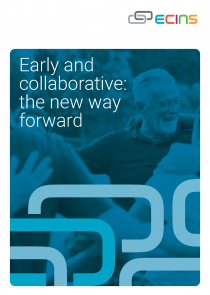As part of the Government’s Welfare Reform Bill, Universal Credit was launched in February 2015 with the aim of modernising and streamlining the UK’s benefit system.
Eleven local authority areas successfully bid for a joint Local Authority and Job Centre Plus 12 month pilot, run in partnership and funded by the Department for Work and Pensions (DWP). The pilot, which began in September 2014, was set up to provide feedback on how best to support vulnerable people during and following the Universal Credit roll out.
ECINS worked closely with Derby City Council, one of the successful bidders, to deliver a Needs Assessment Tool that allows practitioners to risk assess and prioritise the specific needs of individuals. The information gained from the Needs Assessment Tool automatically delivers referrals to a number of partner agencies who can then provide appropriate support.
Councillor Sarah Russell, Cabinet Member for Housing, Finance and Welfare at Derby City Council said “This new way of working is a fantastic step forwards and will save both practitioners and residents a great deal of time.
“The fact we were successful in our bid to take part in this pilot was fantastic news for Derby. It shows we are in touch with our communities, understand the complexities of the welfare reforms and realise the impact they have had on local people. There are some vulnerable groups who need additional support to help them manage the conversion to Universal Credit and we have been working very hard with our partners, including ECINS, to ease their transition to the new system.”
One of the key criteria for the pilot was to make sure that the more vulnerable people in Derby who were moving to the new benefit system were supported and prepared for the transition.
Effective partnership working was cited by Lord Freud, Minister for Welfare Reform, as being crucial to the success of implementing the Local Authority-led pilots so right from the start a multi-agency approach with a standardised triage system would be the way forward.
However, like many Local Authorities in the country, Derby City Council had to make tough decisions as continued cuts to funding by Government took effect. The Council continued to work with local third sector partners to deliver tailored support and advice to those most in need in the city. Working with and introducing ECINS enabled the Council to work with an increasing number of partners who were part of the referral process under the new system.
Kath Gruber, Director for Customer Management and Business Support said of the pilot, “ECINS developed the Needs Assessment Tool to our specification and this provided us with a framework to build a highly-efficient referrals process that supports our work to support Derby’s residents.”The basis of the Needs Assessment Tool is an electronic questionnaire, accessed through ECINS’ secure online platform. It holds an extensive range of questions designed to assess an individual’s circumstances and vulnerabilities such as mental health issues, debts, welfare benefit and employment status, health and wellbeing and a host of other criteria.
The Needs Assessment Tool was built following feedback from partners that unless you are a Welfare Benefits or Specialist Adviser with an in-depth knowledge of a wide range of services, it is almost impossible to navigate through the process of getting the right support for a Claimant. Because the Needs Assessment Tool is automated and the referrals are built in, it can be used effectively by a range of Advisers including volunteers without needing specific or in-depth knowledge. It was also designed to help Advisers gain a fuller understanding of a person’s individual needs. A Claimant may present themselves to the Homeless Team but they may have a range of problems that unless they are addressed, will continue to prevent them from getting into work.
Early feedback from partners accessing ECINS is that they’ve never been so linked in to services; they can see what’s going on with every service and with every customer including notes from all partners offering support. All this information is helping us and our partners make informed decisions about the most appropriate time to move things forward.
The Needs Assessment Tool is used face to face in a variety of premises and also via the telephone. Claimants can get help from the Local Assistance Teams at Derby City’s Council Offices and Job Centre Plus, Citizens Advice and Law Centre, Local Area Coordination Team, Priority Families (Troubled Families), at Derby Homes (RSL) and Single Point of Entry (Homeless Team).
Kate Green, Welfare Assistance Development Manager said;
“From the Council’s point of view, before we started using the Needs Assessment Tool we would signpost customers to various agencies where they could seek support for themselves. Now, what we have with ECINS is the ability to see the bigger picture and understand the type of support they need to help them in the right way. It is also an opportunity for individuals to get to grips with the extent of their own problems and begin the journey to overcome them. The automatic referrals that are made through ECINS and communicated back to the claimant ensures that the work we do with our partners is far more than just a sticking plaster and can actually provide individuals with access to the right kind of support and advice specifically tailored to their precise needs. Together with our partners we can then track an individual’s progress and carry out interventions, for example checking they have turned up for appointments and are working towards specific goals.”
Gary Pettengell, ECINS CEO said;
“The Needs Assessment Tool is one of the largest pieces of functionality we developed for ECINS and in a very short timescale. We are extremely proud to have been involved in such an important piece of work. Our sole purpose in creating ECINS was to solve community problems by maximising participation. Being able to wrap support around an individual by engaging with partners to securely share information is what the system was designed for and Derby City Council’s work is a prime and absolute example of ECINS at its best. We were delighted to work with them to tailor ECINS to support the needs of their community”.


